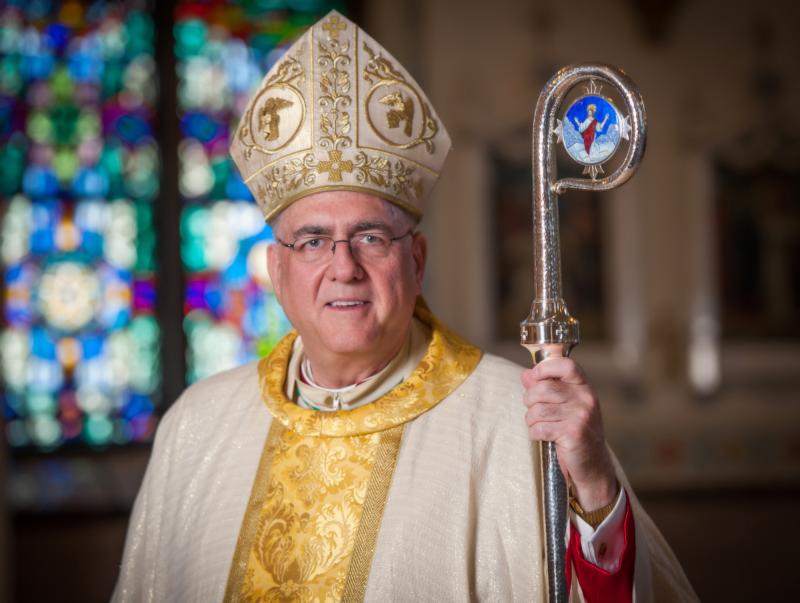
by Archbishop Joseph F. Naumann
This Sunday begins National Marriage Week that concludes next Sunday (Feb. 14) with World Marriage Day, coinciding this year with Valentine’s Day.
Often in the church when reference is made to a vocation crisis, we think of priesthood and religious life. However, sadly today there is also very much a crisis of marriage.
For the first time in the history of the United States, less than 50% of the adult population is married. This decline in marriages is a result of many young adults delaying marriage, many couples choosing to cohabit and forego marriage completely, the high divorce rate and the fear of commitment for many young adults.
Marriage is the foundation of the family. The family is the foundation for our communities, our nation and church. Social science data supports that children on average do much better if they live in the same household with their biological mother and father. We all have a stake in the health and vibrancy of marriage and family life.
Recently, I read the book “Salt and Light: The Spiritual Journey of Elisabeth and Felix Leseur,” written by Bernadette Chovelon and translated into English by Mary Dudro. It is an amazing and beautiful love story.
Though Felix and Elizabeth were married in 1889, almost 132 years ago, their story remains remarkably relevant today.
Felix and Elizabeth both came from affluent and devoutly Catholic families. They both loved art, literature, music, culture and travel.
There was just one major difference. Felix, during his time in medical school, had abandoned his Catholic faith and had become an anticlerical atheist, while Elizabeth was strong and fervent in her Catholic faith.
Felix considered it part of his mission to liberate Elisabeth from what he considered her primitive faith. Elisabeth, on the other hand, was convinced that Felix would recover his Catholic faith.
Unfortunately, in the first weeks of their marriage, Elisabeth became very sick. It turned out to be a chronic illness that incapacitated her for long periods of time. Sadly, her illness prevented her from even being able to attend her own father’s funeral.
Felix did not persevere in a medical career. Instead, he became a journalist. This suited him well because it allowed him to become more involved in politics, which was one of his passions. It was his job to write and comment on current events.
His love for travel fed his ambition to work in the foreign service. However, in the end, Felix turned down the opportunity of a post in the French colonies because of his concerns about its impact upon Elisabeth’s delicate health. Instead, Felix accepted a position in a large insurance firm.
In a relatively short time, Felix became the director of one of France’s most profitable insurance companies. The couple continued to enjoy a vibrant social life with most of their friends sharing Felix’s atheism and anticlericalism.
Felix consciously and deliberately attempted to shake Elisabeth’s faith. For a time, he succeeded as Elisabeth became more captivated by their elegant lifestyle and neglected the practice of her faith.
Around this time, Elisabeth asked her husband to recommend a book from his personal library that she could read and discuss with him. Felix felt this was his opportunity to eradicate any vestiges of faith in his wife.
Felix encouraged her to read Renan’s “The Origins of Christianity.” Elisabeth carefully studied Renan’s writings and eventually also read his book “The Life of Jesus.” Elisabeth recognized that Renan’s understanding of the Scriptures was incorrect and quite distorted. Elisabeth checked the sources cited by Renan and discerned the poverty of Renan’s (a former seminarian) understanding of Jesus and Christianity.
Renan had the opposite effect of what Felix had desired. Renan inspired Elisabeth to rediscover her Catholic faith, in a much deeper and more profound way.
Not only did she intellectually understand the power and the beauty of the Gospel and Catholic teaching, but she began to develop a rich interior life of prayer. Elisabeth had the wisdom and insight into her husband to know that sharing the depth of her faith and spiritual life would drive a wedge in their marriage.
Instead, she chose to pray intensely and offer up her physical suffering for the grace for Felix to rediscover faith. Unable to converse with Felix about the amazing graces she was receiving from the sacraments and prayer, she kept a journal that recorded her remarkable spiritual insights, the depth of her prayer life, her persistent prayer and sacrifices for Felix and the pain she experienced from not being able to share her faith life with the man she loved.
After almost 25 years of marriage, her chronic illness caused her premature death in 1914. Felix was heartbroken. He began to read her diaries. Felix was saddened and embarrassed to realize how much suffering he had caused Elisabeth. He was amazed and humbled to read how much she prayed and offered her suffering for him and his conversion.
Felix eventually began to publish her diaries and letters. Many were touched and inspired by Elisabeth’s example of faith. Slowly, Felix began to reacquaint himself with the Catholic faith.
He accepted invitations to speak to groups about his wife’s writings and the depth of her prayer life. Her persevering prayers and sacrifices proved effective. Not only did Felix rediscover the beauty and joy of his Catholic faith, he became a Dominican priest.
The story of Elisabeth and Felix Leseur is very much a story for our times. Many husbands and wives today do not share the same level of faith.
Elisabeth’s story reveals that the witness of faithful and tender love is more powerful in transforming another’s heart than argumentation. Elisabeth also recognized the power in her physical suffering.
Rather than becoming angry and bitter regarding her poor health, she used it as a powerful, spiritual tool to intercede for her beloved Felix.
The church and world needs more love stories like that of Elisabeth and Felix Leseur.


